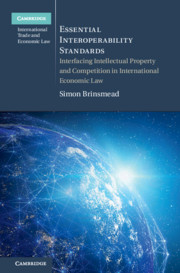 Essential Interoperability Standards
Essential Interoperability Standards Book contents
- Essential Interoperability Standards
- Cambridge International Trade and Economic Law
- Essential Interoperability Standards
- Copyright page
- Dedication
- Contents
- Foreword
- Preface
- Abbreviations
- Part I Foundations and Problems
- Part II The Impact of Intellectual Property and Competition Laws
- 4 Interoperability Standards and Intellectual Property
- 5 Interoperability Standards and Competition Law
- Part III Towards Liability and Compensation
- Bibliography
- Index
5 - Interoperability Standards and Competition Law
from Part II - The Impact of Intellectual Property and Competition Laws
Published online by Cambridge University Press: 26 October 2021
- Essential Interoperability Standards
- Cambridge International Trade and Economic Law
- Essential Interoperability Standards
- Copyright page
- Dedication
- Contents
- Foreword
- Preface
- Abbreviations
- Part I Foundations and Problems
- Part II The Impact of Intellectual Property and Competition Laws
- 4 Interoperability Standards and Intellectual Property
- 5 Interoperability Standards and Competition Law
- Part III Towards Liability and Compensation
- Bibliography
- Index
Summary
This chapter details how competition laws have, to date, addressed matters associated with interoperability standards and SEIP. Particular focus is given the essential facilities doctrine. In the United States, the essential facilities doctrine has been abandoned; in the EU, refusal to licence can constitute an abuse of a dominant market position in the relatively narrow circumstances outlined in the ‘exceptional circumstances’ test applied in the Magill and IMS Health cases. Consideration is also given to the law and economics analysis of the relevant laws and practices. It is concluded that the essential facilities doctrine, as applied to interoperability standards and SEIP, would not provide a helpful basis for binding disciplines at the international level because of entrenched differences between leading jurisdictions, as well as its questionable standing in the context of law and economics scholarship. The work also includes discussion and analysis of other applicable principles of competition law in the context of interoperability standards, including concerted practices, fraud or misconduct in the creation of standards, tying, and the somewhat controversial doctrine of excessive pricing.
Keywords
- Type
- Chapter
- Information
- Essential Interoperability StandardsInterfacing Intellectual Property and Competition in International Economic Law, pp. 157 - 230Publisher: Cambridge University PressPrint publication year: 2021
